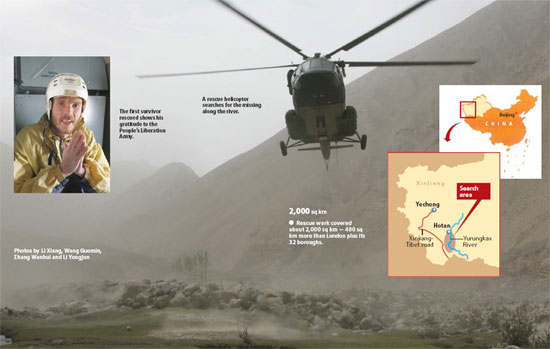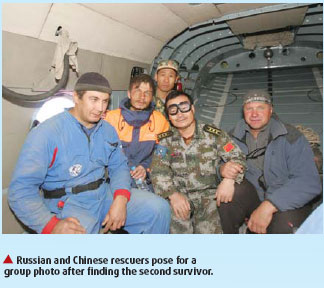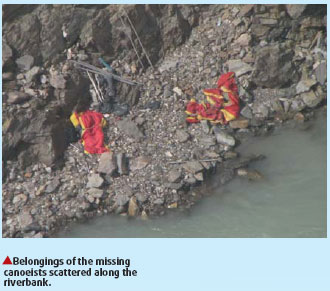The phone rings at 9 pm on September 6, bringing with it terrible news. Wang Zongming, director of emergency management office in Hotan - 1,000 km to the south of Xinjiang Uygur Autonomous Region's capital of Urumqi - is told by the local tourism office that six Russian tourists have gone missing. The tourists had set off on August 21 on a canoe trip down the Yurungkax River but hadn't turned up for the meeting with their interpreter on September 2, as planned.
The second survivor is carried off a PLA search helicopter.
Wang immediately alerts the local authorities and rushes to his office. In just 10 minutes, Hotan Area Secretary Cheng Zhenshan organizes 10 other departmental heads of the local administration, the military and bureaus of public security, water management, weather and tourism. After quickly going over the case, they decide to set up a rescue headquarters and mobilize 1,000 residents along the river to search for the six Russians.
A massive search operation is launched at the crack of dawn the very next day along the Yurungkax River in a remote, snowy area of the Kunlun Mountains. Three days pass but nobody is found.
The missing tourists had no food on them and the temperature has dipped to minus 10 C, leading to fears for their lives. Desperate, the local authorities appeal for help from the Xinjiang Uygur Autonomous Region government.
On September 10, Xinjiang Military Area receives a rescue order. A helicopter joins the search operation, leaving Urumqi at
11:30 am. Flying over the Tianshan Mountain, captain Zhong Jianwen and co-pilot Xu Zhi have a hard time keeping the helicopter afloat in the harsh conditions.
It takes them hours to reach the Yurungkax River - "dead zone", as the local people call the stretch in the southern part of Hotan. The epithet is well earned as the 560-km river originating in the Kunlun Mountains is lined with bodies of wild animals that fell into the valley.
Flying low and dodging unpredictable air current and the cliffs that dot the riverbanks, the helicopter scans the entire stretch along the river in the valley. The smallest of errors can put the pilots' lives at risk. They return in the afternoon empty-handed.
The next day, a second flight mission fails to find anything, but a breakthrough is made in the afternoon on the third trip. The pilots find three red rubber rafts in the upper reaches.
A Russian plane carrying Russian search and rescue members arrive at Hotan the same day to join the operation. Over the next three days, the Chinese helicopter makes seven trips.
On September 15, four rescuers land where the rafts were found. The bodies of Sergey Chernik, 47, and his son Ivan, 25, are recovered from under the rafts on the riverbank. Two other Chinese helicopters join the search operation the next day. A third body, that of Vladimir Smetannikov, 25, is found about 19 km downstream.
Air search for the other three resume on September 18 afternoon after an interruption caused by a sandstorm. On September 21, rescuers find the first survivor, Alexander Zverev, 25, on the banks of the upper reaches.
Dazed, stubbled and emaciated, Zverev is still wearing his white canoeing helmet and a yellow-and-blue waterproof jacket. Hours later, another survivor, 28-year-old Andrei Pautov, is found.
There's still no news about the sixth missing tourist, Dmitry Tishchenko.
With most of his fellow travelers dead, one can understand why Zverev says: "Who I want to thank is not God but the great Chinese people and the great People's Liberation Army."
Rescue timeline:
August 21 Six Russians set off on a canoe trip down the Yurungkax River.
September 2 They fail to meet their interpreter, as planned.
September 6 Hotan sets up a rescue headquarters after being informed about the emergency.
September 7 to 9 Hotan mobilizes 1,000 people to search for the missing but they find nothing.
September 10 A Chinese military helicopter joins in the search.
September 11 The Chinese helicopter finds abandoned rafts. A Russian plane carrying search and rescue members arrive at Hotan the same day.
September 15 Two bodies of the missing are recovered.
September 16 Two more Chinese helicopters join the search. A third body is found.
September 21 Rescuers find two survivors. There is no news about the sixth missing Russian.
(China Daily September 26, 2007)






